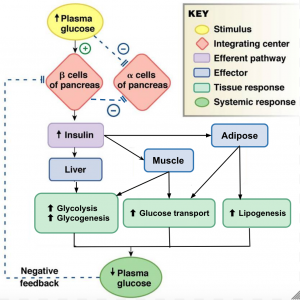Introduction
Glucose is the primary source of energy for the body’s cells. Maintaining stable glucose levels is crucial for overall health and well-being. Diet plays a significant role in regulating glucose levels, and understanding this link is essential for managing conditions like diabetes and promoting overall health.
How Diet Affects Glucose Levels
When we eat, the carbohydrates in our food are broken down into glucose, which enters the bloodstream. The body then releases insulin, a hormone that helps regulate blood sugar levels by allowing cells to absorb glucose for energy or storage. The type and amount of carbohydrates consumed, as well as the presence of other nutrients like fats and proteins, can impact how quickly glucose is absorbed into the bloodstream and how effectively insulin works.
Carbohydrates
Carbohydrates are the main macronutrient that affects blood glucose levels. Simple carbohydrates, like sugar and refined grains, are quickly broken down into glucose, causing rapid spikes in blood sugar levels. On the other hand, complex carbohydrates, found in whole grains, fruits, and vegetables, are digested more slowly, leading to a more gradual release of glucose into the bloodstream. Choosing complex carbohydrates over simple ones can help stabilize blood sugar levels and prevent sudden spikes and crashes.
Fats
Fats can also influence blood sugar levels. High-fat meals can slow down the digestion and absorption of carbohydrates, leading to a more gradual rise in blood glucose levels. However, consuming too much saturated and trans fats can increase the risk of insulin resistance and type 2 diabetes. Opting for healthy fats like those found in nuts, seeds, avocados, and olive oil can help support overall health and glucose regulation.
Proteins
Proteins play a role in regulating blood sugar levels as well. Eating protein-rich foods can help slow down the digestion of carbohydrates, preventing sharp spikes in blood glucose levels. Additionally, protein can help promote satiety and stabilize energy levels throughout the day. Including a source of lean protein in each meal can support balanced blood sugar levels and overall health.
Managing Glucose Levels Through Diet
For individuals with diabetes or those looking to optimize their blood sugar levels, making thoughtful dietary choices is essential. Here are some tips for managing glucose levels through diet:
1. Focus on Whole Foods
Whole foods like fruits, vegetables, whole grains, lean proteins, and healthy fats are rich in nutrients and fiber, which can help regulate blood sugar levels. Aim to fill your plate with a variety of colorful, nutrient-dense foods to support overall health and glucose control.
2. Monitor Carbohydrate Intake
Keeping track of carbohydrate intake can help individuals with diabetes manage their blood sugar levels effectively. Balancing carbohydrate intake with protein and healthy fats can prevent rapid spikes in blood sugar and promote more stable energy levels throughout the day.
3. Choose Low-Glycemic Foods
Foods with a low glycemic index (GI) are digested more slowly, leading to a more gradual rise in blood glucose levels. Opt for low-GI foods like whole grains, legumes, non-starchy vegetables, and fruits to support balanced blood sugar levels.
4. Practice Portion Control
Eating appropriate portion sizes can help prevent overeating and manage blood sugar levels. Use measuring cups, food scales, or visual cues to gauge portion sizes and avoid consuming excessive amounts of carbohydrates or calories.
5. Stay Hydrated
Drinking an adequate amount of water can support proper hydration and help regulate blood sugar levels. Dehydration can lead to elevated blood sugar levels, so be sure to stay hydrated throughout the day.
Conclusion
Understanding the link between diet and glucose levels is crucial for promoting overall health and managing conditions like diabetes. By making mindful dietary choices, focusing on whole foods, monitoring carbohydrate intake, choosing low-glycemic foods, practicing portion control, and staying hydrated, individuals can support balanced blood sugar levels and optimize their well-being. Consulting with a healthcare provider or registered dietitian can provide personalized guidance and support for managing glucose levels through diet.

